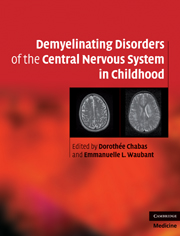Book contents
- Demyelinating Disorders of the Central Nervous System in Childhood
- Demyelinating Disorders of the Central Nervous System in Childhood
- Copyright page
- Contents
- Contributors
- Abbreviations
- Preface
- Chapter 1 Introduction: historical perspective of pediatric multiple sclerosis and related disorders
- Chapter 2 Controversies around the current operational definitions of pediatric MS, ADEM, and related diseases
- Section 1 Pediatric MS Diagnosis
- Section 2 Pediatric MS Course and Treatment
- Chapter 7 Pediatric multiple sclerosis course and predictive factors
- Chapter 8 Plasma exchange and IV immunoglobulin for acute demyelinating relapses
- Chapter 9 Corticosteroids in pediatric multiple sclerosis relapses
- Chapter 10 Disease-modifying therapy and response to first-line treatment in pediatric multiple sclerosis
- Chapter 11 Treatment of breakthrough disease
- Chapter 12 Symptomatic therapy in pediatric multiple sclerosis
- Chapter 13 Cognitive dysfunction in pediatric-onset multiple sclerosis
- Chapter 14 Living with pediatric multiple sclerosis: patient well-being
- Section 3 Pediatric MS Biology
- Section 4 ADEM
- Section 5 Optic Neuritis in Children
- Section 6 Acute Complete Transverse Myelitis in Children
- Section 7 Neuromyelitis in Children
- Index
Chapter 13 - Cognitive dysfunction in pediatric-onset multiple sclerosis
from Section 2 - Pediatric MS Course and Treatment
Published online by Cambridge University Press: 11 April 2011
- Demyelinating Disorders of the Central Nervous System in Childhood
- Demyelinating Disorders of the Central Nervous System in Childhood
- Copyright page
- Contents
- Contributors
- Abbreviations
- Preface
- Chapter 1 Introduction: historical perspective of pediatric multiple sclerosis and related disorders
- Chapter 2 Controversies around the current operational definitions of pediatric MS, ADEM, and related diseases
- Section 1 Pediatric MS Diagnosis
- Section 2 Pediatric MS Course and Treatment
- Chapter 7 Pediatric multiple sclerosis course and predictive factors
- Chapter 8 Plasma exchange and IV immunoglobulin for acute demyelinating relapses
- Chapter 9 Corticosteroids in pediatric multiple sclerosis relapses
- Chapter 10 Disease-modifying therapy and response to first-line treatment in pediatric multiple sclerosis
- Chapter 11 Treatment of breakthrough disease
- Chapter 12 Symptomatic therapy in pediatric multiple sclerosis
- Chapter 13 Cognitive dysfunction in pediatric-onset multiple sclerosis
- Chapter 14 Living with pediatric multiple sclerosis: patient well-being
- Section 3 Pediatric MS Biology
- Section 4 ADEM
- Section 5 Optic Neuritis in Children
- Section 6 Acute Complete Transverse Myelitis in Children
- Section 7 Neuromyelitis in Children
- Index
Summary
Keywords
- Type
- Chapter
- Information
- Publisher: Cambridge University PressPrint publication year: 2011
- 2
- Cited by

